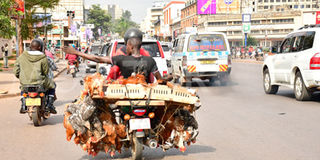Prime
Rising prices of goods dampen Easter mood

A trader transports chicken to Nsambya, a Kampala City suburb, on April 14, 2022. Business was slow in Kampala with traders attributing the low sales to rising commodity prices. Photo/Stephen Otage
What you need to know:
The prices of foodstuff have doubled.
Business was slow in Kampala yesterday with traders attributing the low sales to rising commodity prices that have made most products unaffordable.
Kampala City and surrounding areas are usually a bee-hive of activities during Easter season, with lots of merrymaking and shopping. It’s a peak season where traders are able to maximise profits due to increased demand for a range of products.
When Monitor visited some of the shopping centres yesterday, traders said business was still sluggish.
Ms Mable Kisakye, a matooke trader operating from Nakasero Market, said the rise in fuel prices has increased the transport costs, and they are left with no option but to increase the prices for products.
Initially, they were selling a bunch of matooke at Shs20,000 but now it goes for Shs40,000.
Mr Ismail Mpamba, a butcher at Nakasero market, said: “We were expecting customers after the Lent period but unfortunately, the commodity prices have also skyrocketed. A kilogramme of meat is now ranging from Shs14, 500 to Shs16, 000. We have left everything to God.”
Ms Annet Namuddu, a vegetable seller, is convinced that the increase in prices of commodities was triggered majorly by high taxes levied on suppliers by the government.
She says the farm gate price for a box of tomatoes has increased from Shs150,000 to Shs300, 000.
Mr Moses Kajjubi, a rice seller in Nakasero Market, said a bag of rice now goes for Shs550, 000 from Shs300,000 a few months ago.
“Customers have embraced buying but at a negotiable price because they know what is happening. Government has failed to rescue us,” Mr Kajjubi said.
A member of the Nakasero market executive, Mr Isma Kamulegeya, warned the public that prices will continue skyrocketing as long as the fuel prices are still high.
Ms Rebecca Mirembe, a parent, said she would have loved to shop for Easter but she can’t do it as she has to start saving money for her children’s school fees for second term.
The chairman of Kampala City Traders Association (Kacita), Mr Thadeus Nagenda, said traders dealing in garments could be making a killing, although people are focusing on essential commodities which are also very expensive.
He said a month ago, Kacita wrote to President Museveni, requesting him to intervene in the rising commodity prices. The President then directed the Ministry of Finance to come up with a committee to identify possible solutions.
The committee consisted of representatives from the Uganda Manufacturers Association, State House Economic Monitoring Unit and Ministry of Finance.
He said the committee was also tasked to investigate claims that some traders and manufactures were hoarding commodities to maximise profits.
Some of the recommendations that Kacita fronted were operationalisation of the rail transport system to transit goods from ports of entry in Mombasa and Dar es salaam to Uganda, revision of tax measures such as reducing the taxes levied on each litre of fuel from Shs1,500 to at least Shs200 and also allow them import cheaper products among other issues.
Govt reacts
In an interview with this publication in March, Mr Ramathan Ggoobi, the permanent secretary in the Ministry of Finance, said the government cannot solve the problem of skyrocketing commodity prices because it is a global crisis.
“We are not going to subsidise anything. Subsidies don’t work and that is bad economics. Those who have done it have faced problems. Subsidies tend to take money from the wrong people. The mafia can organise and take all money for subsidies,” Mr Ggoobi said.
READ MORE





